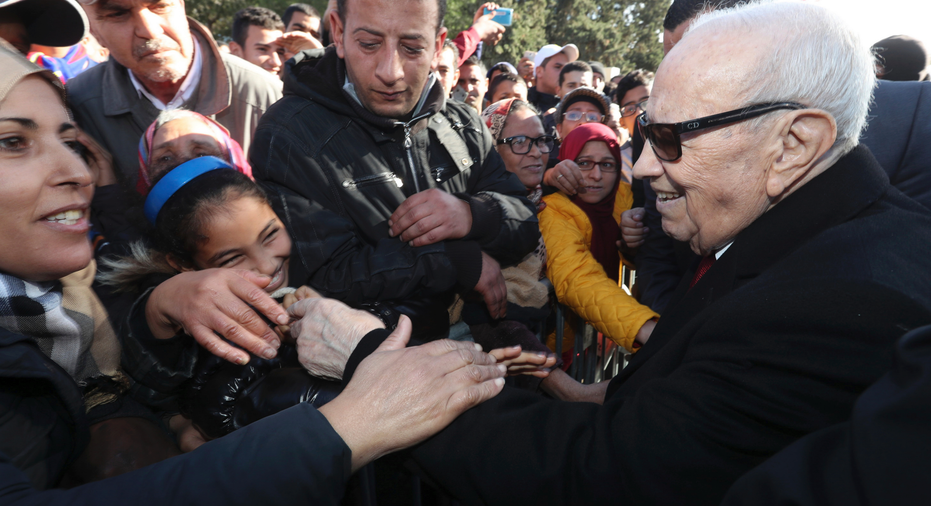Tunisians call on leaders to remember 2011 revolution goals

TUNIS, Tunisia – More than 2,000 Tunisians rallied Sunday for the North African nation's leaders to do away with punishing price hikes that triggered days of unrest and to respect the goals of the revolution that drove out the country's autocratic ruler seven years ago.
To placate protesters angered by a new finance law raising prices of essential goods, Tunisian authorities announced plans to boost aid to the needy. The measures announced Saturday night weren't enough for many of the people marking the revolution anniversary in the capital.
"We're going to keep putting pressure on the government until the revision of the new finance law that makes the poor poorer and the rich richer," Hamma Hammami, leader of the Popular Front, a coalition of leftist parties, told the crowd.
Demonstrations against the law degenerated into days of turmoil across Tunisia last week, leaving one person dead, scores injured and police stations and stores damaged or pillaged. Nearly 780 people were arrested.
On Sunday, Tunisian President Beji Caid Essebsi inaugurated a youth center in a housing project outside Tunis that was a site of the recent unrest. The building, burned during the 2011 revolution, was renovated with private funds. Essebsi called it a "model."
"The year 2018 will be marked by our focus on youth," the 91-year-old president said, noting chronic joblessness in Tunisia, including for some 250,000 university graduates.
He announced the creation of a "solidarity fund" for needy families.
Prime Minister Youssef Chahed is to allocate 100 million dinars (about $40 million) to help 200,000 of the neediest families plus free health care for the jobless, Social Affairs Minister Mohamed Trabelsi announced after a Saturday night Cabinet meeting.
The Tunisian economy has struggled since President Zine el-Abidine Ben Ali fled into exile on Jan. 14, 2011, transforming the country into a budding democracy that inspired the Arab Spring — then defied it by being the only country to keep its transition peaceful.
But six governments later, loans weigh on the economy, extremist attacks have sapped the important tourism sector, and regions far from the capital, where the revolution was ignited, remain neglected.
The jobless rate is officially above 15 percent and stands above 25 percent in some regions, with vast areas of the interior still marginalized. With inflation officially above 6 percent, the 2018 finance law raising prices and adding new taxes brought people into the streets.
The Popular Front and associations had called for peaceful protests to tell the country's current leaders they have failed to honor the hope for social and economic justice behind the revolution.
"We are proud of our freedoms, but we are far from the goals of the revolution concerning dignity and betterment of the population's conditions," opposition lawmaker Ghazi Chaouachi said during an interview Sunday.
Chaouachi said he hoped for change by "keeping pressure on the government to realize minimum expectations."
Security was tight at Sunday's rally on the Avenue Bourguiba, where tens of thousands shouted for Ben Ali to "get out" seven years ago.
One demonstrator held up a shopping basket with a sign: "2018. The basket is empty."
Fatma Ben Hassine echoed that message ahead of the rally, carrying a nearly empty shopping basket as she spoke.
"The revolution brought nothing concrete to our daily lives, which only get worse and worse," she said. "The politicians, whose only concern is their comfort, leave us in despair."
The revolution was sparked by the death of a fruit and vegetable seller in the central town of Sidi Bouzid who set himself afire Dec. 10, 2010, in apparent anger and despair over mistreatment by police who upset his cart. That region and others outside the capital have a history of neglect by central authorities — and were the focus of promises for change by leaders of Tunisia's new era.
The democratic transition gave Tunisia a new constitution, opened the way to free elections and reinforced equality among sexes — all while Tunisia battled deadly extremist attacks, including on tourists at the famed Bardo Museum and at a resort hotel outside the seaside town of Sousse.
But some essentials have been ignored. Frustration was in full view last week when small demonstrations ballooned and then degenerated into theft, pillaging and car-burning in some places as momentum grew. A police crackdown stemmed the protests by week's end.
___
Elaine Ganley contributed from Paris.



















